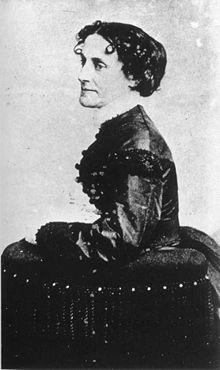Elizabeth Van Lew
| Elizabeth Van Lew | |
|---|---|

Portrait of Elizabeth Van Lew
|
|
| Born |
12 October 1818 Richmond, Virginia |
| Died | 25 September 1900 (aged 81) Richmond, Virginia |
| Resting place |
Shockoe Hill Cemetery 37.551816, -77.432016 |
| Residence | 2301 E. Grace Street, Richmond, Virginia (now Bellevue Elementary School) |
| Nationality | American |
| Other names | "Crazy Bett" |
| Known for | Espionage during the American Civil War |
Elizabeth Van Lew (October 12, 1818 – September 25, 1900) was a Richmond, Virginia abolitionist and philanthropist who built and operated an extensive spy ring for the United States during the American Civil War.
Elizabeth Van Lew was born on October 12, 1818, in Richmond, Virginia to John Van Lew and Eliza Baker, whose grandfather was Hilary Baker, mayor of Philadelphia from 1796 to 1798. Elizabeth's father came to Richmond in 1806 at the age of 16 and, within twenty years, had built up a prosperous hardware business and owned several slaves.
Her family sent Van Lew to Philadelphia for her education at a Quaker school, which reinformed her abolitionist sentiments. When her father died in 1843, Van Lew and her mother freed the family's slave. Many of the emancipated slaves continued as paid servants with the family, including the young future Union spy Mary Bowser. In the depths of the 1837–44 depression, Elizabeth used her entire cash inheritance of $10,000 (nearly $200,000 in current money) to purchase and free some of their former slaves' relatives. For years thereafter, Elizabeth's brother was a regular visitor to Richmond's slave market, where, when a family was about to be split up, he would purchase them all, bring them home, and issue papers of manumission.
Upon the outbreak of the war, Van Lew began working on behalf of the Union with her mother, caring for wounded soldiers. When Libby Prison was opened in Richmond, Van Lew was allowed to bring food, clothing, writing paper, and other things to the Union soldiers imprisoned there. She aided prisoners in escape attempts, passing them information about safe houses and getting a Union sympathizer appointed to the prison staff. Recently captured prisoners gave Van Lew information on Confederate troop levels and movements, which she was able to pass on to Union commanders. She even helped hide escaped Union prisoners and Confederate deserters in her own mansion.
Van Lew also operated a spy ring during the war, called "Richmond Underground," including clerks in the War and Navy Departments of the Confederacy and a Richmond mayoral candidate. Van Lew reportedly convinced Varina Davis to hire Bowser as a household servant, enabling Bowser to spy in the White House of the Confederacy. Varina Davis adamantly denied ever hiring Bowser, although it would be unlikely she would have known of Bowser's real identity or admitted hiring her after the fact. Although Bowser used several pseudonyms during and after the war, making her contributions especially difficult to document, newly uncovered sources confirm her involvement in the Union espionage circle run by Van Lew. Van Lew's spy network was so efficient that on several occasions she sent Lt. Gen. Ulysses S. Grant fresh flowers from her garden and a copy of the Richmond newspaper. She developed a cipher system and often smuggled messages out of Richmond in hollow eggs. Union commanders highly valued Van Lew's work; George H. Sharpe, intelligence officer for the Army of the Potomac, credited her with "the greater portion of our intelligence in 1864-65." Because of the merit of her work, General Grant appointed Van Lew Postmaster General of Richmond for the next eight years.
...
Wikipedia
